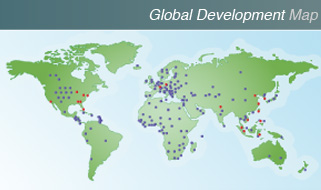-
"Not all those who wander are lost."
J.R.R. Tolkien, The Fellowship of the Ring
Posted October 4, 2012
Neuralstem recently announced that it has received approval to begin a trial to treat stroke patients in China. The trial will be conducted at the Ba Yi Brain Hospital in Beijing. It will be the world's first trial where our neural stem cells will be injected directly into the brain to treat patients with chronic motor disorders from stroke.
But the story of how we can treat stroke will wait for another column. After the announcement, many of you have asked what a small Company like Neuralstem is doing developing a product in China? I would like to assure all of the stakeholders in Neuralstem, that while our steps may indeed take us far from home, we are not lost.
So, why China? There are many reasons. It is clear that the world is changing and there is world class science and world class medicine being practiced everywhere. Our near virtual model lends itself to finding the most productive use of resources to move our products forward. We are not, and can not, be constrained by distance or culture. Ba Yi is a first class neurosurgery hospital and research center. We will be using a protocol developed by and with the University of Pittsburgh for a filing to come in the future in the U.S. We will be using the same cells from the same manufacturing process that have been approved by the FDA for our ALS trial here in the U.S. We are confident in the quality of the care our patients will receive.
Conducting the trial in China will allow us to aggregate data much quicker than in the U.S. This is simply a fact. The FDA has taken a very cautious approach to neural stem cell therapies. Our ALS trial was limited to one patient per month. The regulatory path approved in China will be more condensed. But what people must understand, is that that does NOT mean it will be, in some way, less stringent. Efficacy is efficacy, and it is not one thing in the U.S. and another in China. Nor is safety somehow less of a concern or measured differently from one country to another. What differs from country to country are the policy assumptions underlying the regulatory path.
The U.S. via the FDA has made its choice on the proper balance between the risks of a novel therapy, and the value of treating incurable disease. Other countries look at that same calculation and arrive at a different answer. Neither is wrong, every culture weighs these things and comes to its own conclusions. China has a huge public health problem in an enormous population of non functioning stroke survivors. There are at least 2 million ischemic strokes alone every year in China. To put that in perspective, there are probably no more than 1 million surviving stroke patients in the U.S. combined, from every year in which there are survivors still alive. It is regularly acknowledged as one of China's 5 most serious public health issues and their more aggressive approach is logical and appropriate.
Finally, Neuralstem is a company, not a research institution, and we are developing products. Our mission is not to simply do breakthrough science; it is to create products that can treat patients. Our patients live throughout the world, and we need to develop our products in the markets where we will be treating them. China will clearly be the largest market for our stroke therapy, and it makes sense to develop the product there first, and get it to market there first.
So in the end, China actually offers us a confluence of opportunities; a motivated government that is actively seeking novel solutions to a staggering public health problem; a world class scientific and medical facility; a regulatory path that recognizes the urgency of the issue with an accelerated program schedule; the ability to conduct the research at a fraction of the cost of a similar trial in the U.S.; and upon completion, access to the largest market for this particular product in the world.
For us, the issue was never, "how can we be in China?" For us, the issue has always been, "how could we not be?"






